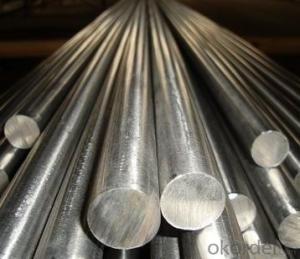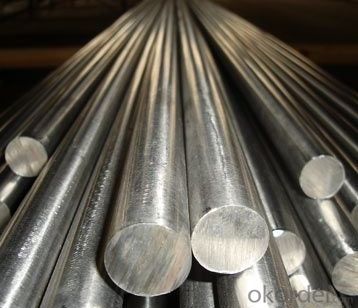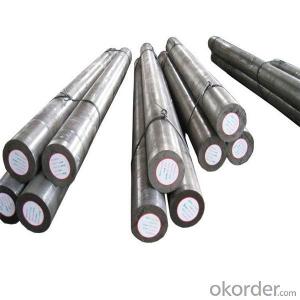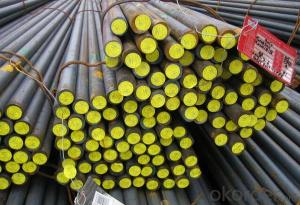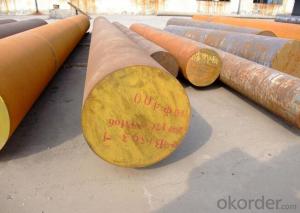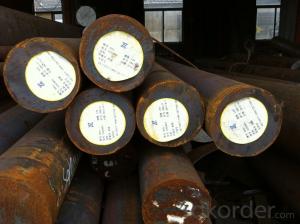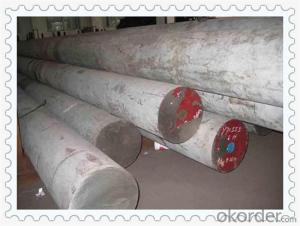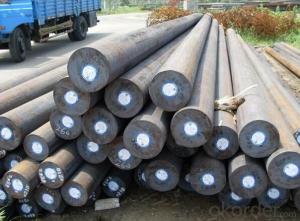Special Steel SAE4140 Alloy Steel Bar 42CrMo4
- Loading Port:
- China main port
- Payment Terms:
- TT OR LC
- Min Order Qty:
- 30 m.t.
- Supply Capability:
- 10000 m.t./month
OKorder Service Pledge
OKorder Financial Service
You Might Also Like
Specification
Product Information
1. Grade: 4140 , SAE4140, 42CrMo4, 1.7225
2. Specification: Dia: 16~800mm Length:2000-13000mm or as required
3. Process: EAF+LF+VD
4. Technique:Forged
5.Treatment:hot rolled,cold drawn
6.Mechanical performance:
Strength of extension | 1080MPA |
Yield point | 930MPA |
Elongation | 12% |
Contractibility rate | 45% |
Impacting energy | 63J |
7. Chemical composition(for reference only)
Grade | C | Si | Mn | P≤ | S≤ | Cr | Mo |
SAE4140 | 0.38/0.43 | 0.15/0.35 | 0.75/1.00 | 0.035 | 0.035 | 0.80/1.10 | 0.15/0.25 |
8. Compared grades of 4140 steel
GB-China | AISI-America | DIN-GERMANY | JIS-Japan |
42CrMo | 4140 | 1.7225 | SCM440 |
Product Show
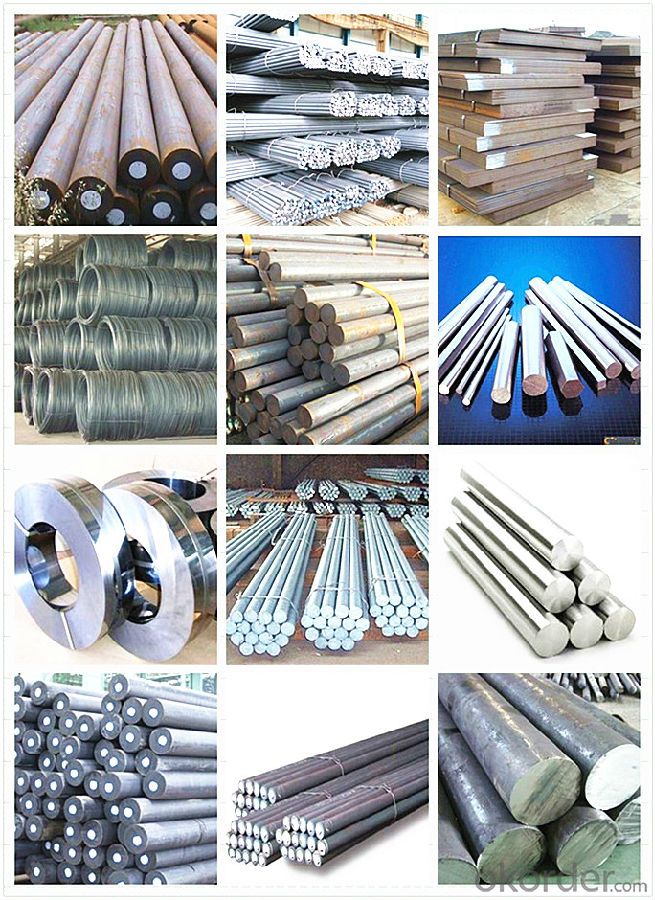
Workshop Show
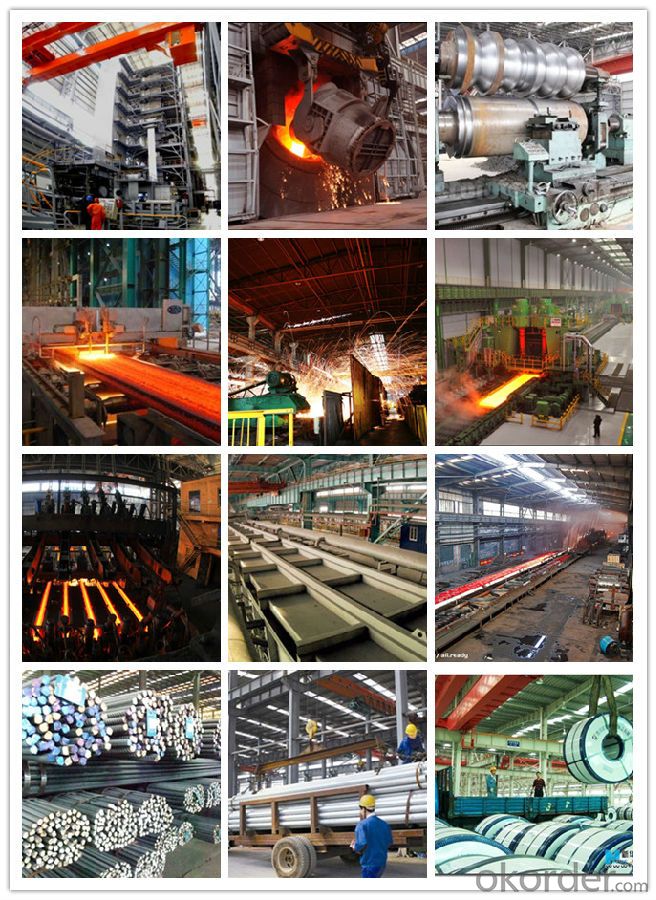
Shipping
1. FedEx/DHL/UPS/TNT for samples, Door-to-Door;
2. By Air or by Sea for batch goods, for FCL; Airport/ Port receiving;
3. Customers specifying freight forwarders or negotiable shipping methods!
Delivery Time: 3-7 days for samples; 5-25 days for batch goods.
Payment Terms
1.Payment: T/T, L/C, Western Union, MoneyGram,PayPal; 30% deposits; 70% balance before delivery.
2.MOQ: 1pcs
3.Warranty : 3 years
4.Package Informations: 1) EXPORT, In 20 feet (GW 25 ton) or 40 feet Container (GW 25 ton)
2)as customer's requirement
Why choose us?
(1) The leading exporter in China special steel industry.
(2) Large stocks for various sizes, fast delivery date.
(3) Good business relationship with China famous factories.
(4) More than 7 years steel exporting experience.
(5) Good after-sales service guarantee.
- Q: How does special steel contribute to the aerospace aftermarket industry?
- Special steel plays a crucial role in the aerospace aftermarket industry by providing high-quality materials that meet the demanding requirements of aircraft maintenance and repair. It is used in various aircraft components, such as engine parts, landing gear, and structural elements, where exceptional strength, corrosion resistance, and heat resistance are necessary. Special steel ensures the durability and reliability of these components, allowing for safer and more efficient flight operations. Additionally, its use in the aerospace aftermarket industry helps reduce maintenance costs and downtime, as it enables longer-lasting and more robust aircraft components.
- Q: How does special steel contribute to the telecommunications machinery industry?
- The telecommunications machinery industry heavily relies on special steel for the production of durable and high-quality equipment. This steel is crucial in providing the necessary materials for antennas, satellite dishes, and transmission towers. These machinery are constantly exposed to different environmental conditions and need to endure extreme weather, corrosion, and mechanical stress. Special steel, renowned for its exceptional strength, toughness, and corrosion resistance, ensures the longevity and reliability of telecommunications equipment. For example, antennas and satellite dishes made from special steel can withstand harsh weather conditions and strong winds without compromising signal quality or structural integrity. Moreover, transmission towers, which play a vital role in efficient signal transmission over long distances, are manufactured using special steel. These towers need to support heavy equipment, endure dynamic loads, and resist corrosion to maintain uninterrupted communication. The high tensile strength and corrosion resistance of special steel guarantee the stability and longevity of transmission towers, ultimately contributing to the overall reliability of the telecommunications network. Additionally, special steel is utilized in the production of cables and connectors used in telecommunications systems. These components require high conductivity, low resistance, and resistance to wear and tear. By incorporating special steel, manufacturers of telecommunications machinery can ensure efficient signal transmission and reduce signal loss, leading to improved communication quality. In conclusion, special steel is indispensable in the telecommunications machinery industry as it provides superior strength, durability, and corrosion resistance. By incorporating special steel into the production of antennas, satellite dishes, transmission towers, cables, and connectors, the industry can deliver reliable and high-quality telecommunications equipment to meet the increasing demands of the modern world.
- Q: What are the different testing methods used for special steel?
- Some of the common testing methods used for special steel include hardness testing, tensile testing, impact testing, metallographic examination, chemical analysis, and non-destructive testing. These methods help assess the mechanical properties, microstructure, chemical composition, and overall integrity of special steel, ensuring its suitability for various applications.
- Q: How is case-hardening steel used in the manufacturing of gears?
- Case-hardening steel is used in the manufacturing of gears to enhance their durability and strength. The process involves heating the steel to a high temperature and then rapidly cooling it to create a hard outer layer, known as the case, while maintaining a relatively softer core. This hardened surface provides resistance to wear, abrasion, and fatigue, allowing the gears to withstand heavy loads and prolonged use. Additionally, case-hardening steel also improves the gear's ability to withstand impact and retain its shape, ensuring efficient and reliable performance in various mechanical applications.
- Q: How does the composition of special steel affect its properties?
- The composition of special steel greatly affects its properties. By adjusting the levels of various elements such as carbon, chromium, manganese, and nickel, the hardness, strength, corrosion resistance, and heat resistance of the steel can be altered. For example, increasing the carbon content in steel can enhance its hardness and strength, while adding chromium can improve its resistance to corrosion. Overall, the composition of special steel plays a crucial role in determining its specific properties and suitability for various applications.
- Q: How does electrical steel contribute to the production of transformers and motors?
- Electrical steel, also known as silicon steel or lamination steel, plays a crucial role in the production of transformers and motors. Its unique magnetic properties make it an ideal material for the cores of these devices. The high silicon content in electrical steel reduces the energy losses that occur due to magnetic hysteresis and eddy currents, making the transformers and motors more efficient. Additionally, the laminated structure of electrical steel helps to minimize the eddy current losses further. Overall, the use of electrical steel in transformers and motors improves their performance, increases energy efficiency, and allows for compact and lightweight designs.
- Q: How does special steel perform in terms of magnetic properties?
- Special steel typically has low magnetic permeability, meaning it has poor magnetic properties. This is due to the presence of alloying elements such as chromium and nickel, which help in reducing the material's magnetic susceptibility. However, there are certain types of special steels, such as ferritic stainless steels, that have higher magnetic permeability. Overall, the magnetic properties of special steel can vary depending on its composition and intended application.
- Q: What are the common alloys used in special steel?
- Some common alloys used in special steel include stainless steel (which contains chromium and nickel), tool steel (which contains tungsten, molybdenum, and vanadium), and high-speed steel (which contains tungsten, molybdenum, and cobalt).
- Q: What properties make special steel unique?
- Special steel, also known as alloy steel, possesses unique properties that set it apart from other types of steel. Firstly, special steel is distinguished by its exceptional strength and hardness. It is engineered to have a high resistance to deformation, making it suitable for applications that require robust materials. Whether in construction, automotive, or aerospace industries, special steel provides the necessary durability and reliability. Another remarkable property of special steel is its superior corrosion resistance. By incorporating certain alloying elements such as chromium, nickel, or molybdenum, this type of steel becomes highly resistant to rust and other forms of corrosion. As a result, special steel is often used in marine environments, chemical plants, and oil and gas industries where exposure to harsh conditions is prevalent. Furthermore, special steel demonstrates excellent heat resistance. It can withstand high temperatures without losing its strength or structure, making it suitable for applications in extreme heat environments, such as power generation or furnace components. This property allows special steel to be utilized in critical situations where other materials may fail or degrade. Special steel is also known for its versatility and adaptability. With various alloying elements and heat treatment processes, it can be tailored to meet specific requirements of different industries. This flexibility makes it possible to create specialized alloys with unique properties, such as improved machinability, wear resistance, or enhanced magnetic properties, catering to a wide range of applications. In conclusion, the properties that make special steel unique are its exceptional strength and hardness, superior corrosion resistance, excellent heat resistance, and its versatility in being tailored to specific requirements. These properties make special steel an invaluable material in numerous industries, enabling the development of innovative and reliable products.
- Q: How does special steel contribute to the medical field?
- Special steel plays a crucial role in the medical field by providing the necessary strength, durability, and corrosion resistance required for various medical instruments and implants. It enables the manufacturing of surgical tools, such as scalpels, forceps, and bone drills, that can maintain their sharpness and withstand repeated sterilization. Moreover, special steel alloys, like stainless steel, are used in the production of implants, prosthetics, and orthopedic devices due to their biocompatibility, strength, and resistance to body fluids. Overall, special steel ensures the reliability and effectiveness of medical equipment, enhancing patient care and surgical outcomes.
Send your message to us
Special Steel SAE4140 Alloy Steel Bar 42CrMo4
- Loading Port:
- China main port
- Payment Terms:
- TT OR LC
- Min Order Qty:
- 30 m.t.
- Supply Capability:
- 10000 m.t./month
OKorder Service Pledge
OKorder Financial Service
Similar products
Hot products
Hot Searches
Related keywords
